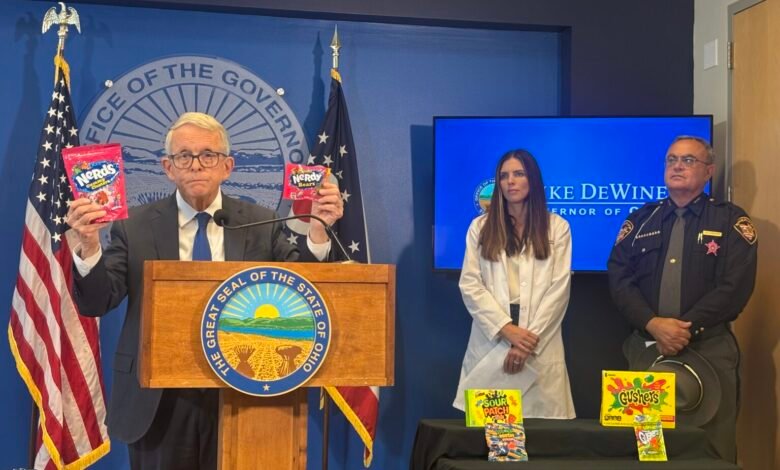Protecting Ohio’s Children: Governor Dewine Bans Intoxicating Hemp Products Amid Growing Concerns

Ohio has taken a bold and controversial step in the battle to protect children and families from unregulated intoxicating hemp products. On Wednesday, October 8, 2025, Governor Mike DeWine announced a 90-day executive order banning the sale of intoxicating hemp products across the state, beginning Tuesday, October 14, 2025.
The emergency order, which lasts until January 12, 2026, immediately prohibits the sale of THC-infused beverages, candies, gummies, and other intoxicating hemp products outside licensed marijuana dispensaries. This means that thousands of gas stations, CBD shops, smoke stores, and convenience outlets must remove these products from their shelves or face $500 fines per day for noncompliance.
THE THREAT TO OHIO’S CHILDREN
Governor DeWine’s decision follows alarming reports from the Ohio Poison Control Center showing at least 257 cases of Delta-8 THC poisoning in recent years, 40 of them involving children under six years old.
These cases are not theoretical. According to Dr. Hannah Hays, Chief of Toxicology at Nationwide Children’s Hospital, children who ingest these products often experience drowsiness, hallucinations, seizures, confusion, respiratory distress, and in severe cases, loss of consciousness.
“Since intoxicating hemp products like Delta-8 became widely available, the number of accidental poisonings among children has risen sharply,” Dr. Hays warned.
During his press conference, Gov. DeWine displayed three examples of these dangerous products;“Stoner Patch Dummies,” “Nerdy Bears,” and “Sour Infused Gummies” all designed to mimic popular candy brands.
One “Nerdy Bear” gummy, for instance, contained over 100 milligrams of THC, ten times more than an average adult cannabis product.
“It’s easy to see how a child could mistake these for candy,” DeWine said. “A few gummy bears could put a child in the hospital.”
THE FARM BILL LOOPHOLE AND A GROWING INDUSTRY
Under the 2018 U.S. Farm Bill, hemp products containing less than 0.3% THC are legal to grow and sell. But over time, chemists discovered ways to manipulate hemp compounds into new intoxicating forms, such as Delta-8 and Delta-9 THC, which can produce psychoactive effects similar to marijuana.
Unlike regulated marijuana, intoxicating hemp products have been widely available without age restrictions or quality testing, leaving children and families exposed to serious risks.
Until this order, Ohio was one of about 20 states with no regulations on intoxicating hemp products, according to a 2024 study by the Ohio State University Drug Enforcement and Policy Center.
SUPPORT AND BACKLASH
The executive order has divided Ohio. Child safety advocates, health professionals, and the Ohio Cannabis Coalition have praised DeWine’s decision, calling it a necessary emergency measure.
However, hemp industry leaders and some lawmakers argue the order is an overreach that threatens jobs and small businesses. The Ohio Healthy Alternatives Association filed a lawsuit against DeWine’s order, claiming the governor exceeded his authority.
Industry representatives and some policymakers insist that responsible stores already impose age restrictions, and that enforcement not blanket bans is the better path.
WHAT COMES NEXT
The Ohio Legislature now faces a critical decision: whether to turn the governor’s 90-day ban into permanent regulation or create balanced legislation to protect children while preserving legitimate businesses.
Several pending bills aim to regulate intoxicating hemp products:
- Senate Bill 266: Bans sales to minors and requires marijuana-level testing and labeling.
- Senate Bill 86: Imposes a 10% tax and age restrictions.
- Senate Bill 56: Limits sales strictly to licensed marijuana dispensaries.
- House Bill 160: Consolidates THC product oversight under Ohio’s marijuana laws.
A LESSON FOR FAMILIES AND COMMUNITIES
For families, this development is a wake-up call. Products that look like harmless candy may contain lethal doses of THC and may be sitting on store shelves within children’s reach.
Parents and caregivers should:
- Monitor what children bring home from stores or friends.
- Discuss the dangers of “look-alike” products that mimic candy or snacks.
- Secure all THC-containing items in locked containers.
- Report illegal sales or suspected poisonings immediately.
- If a child is exposed, contact the Ohio Poison Control Center at 1-800-222-1222.
The next 90 days will reveal whether lawmakers, businesses, and communities can find a path that protects children while upholding fairness and economic stability. But one thing is certain: Protecting Ohio’s children must remain non-negotiable.





